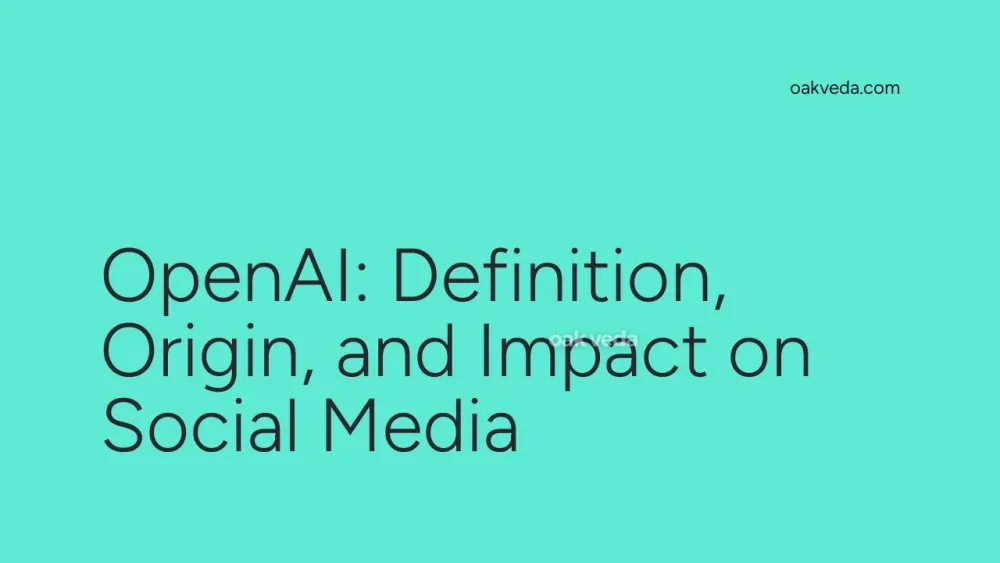
What is OpenAI?
OpenAI is a pioneering artificial intelligence (AI) research laboratory and company dedicated to developing and promoting artificial general intelligence (AGI). Founded in 2015, OpenAI's mission is to ensure that AGI benefits all of humanity. The organization conducts cutting-edge research, develops advanced AI models, and contributes to the global AI community through scientific publications and open-source projects.
Origin and Development of OpenAI
OpenAI was established by a group of tech luminaries, including Elon Musk and Sam Altman, with the initial goal of conducting AI research in an open, transparent manner. Over the years, the organization has evolved, transitioning from a non-profit to a "capped-profit" model in 2019 to attract more funding and talent.
The company has made significant strides in AI development, with its most notable achievements including the GPT (Generative Pre-trained Transformer) series of language models. GPT-3, released in 2020, marked a major milestone in natural language processing, while the more recent GPT-4 has further pushed the boundaries of AI capabilities.
How OpenAI Works
OpenAI's approach to AI development involves:
- Research: Conducting fundamental research in machine learning, robotics, and other AI-related fields.
- Model Development: Creating large-scale AI models, particularly in natural language processing.
- Open Collaboration: Sharing research findings and, in some cases, model architectures with the wider AI community.
- Ethical Considerations: Addressing the potential societal impacts of AI and promoting responsible AI development.
Popular Examples of OpenAI Technology
Some of OpenAI's most well-known technologies include:
- GPT-3 and GPT-4: Large language models capable of generating human-like text, coding, and more.
- DALL-E: An AI system that creates images from textual descriptions.
- Whisper: An automatic speech recognition system that can transcribe and translate multiple languages.
- Codex: An AI system that translates natural language into code, powering GitHub Copilot.
Impact of OpenAI on Social Media Culture
OpenAI's technologies have had a profound impact on social media culture:
-
Content Creation: AI-powered tools can generate engaging posts, captions, and even entire articles, revolutionizing content creation for social media platforms.
-
Personalization: OpenAI's models can analyze user data to provide highly personalized content recommendations, enhancing user engagement.
-
Chatbots and Customer Service: Advanced language models improve chatbot capabilities, enabling more natural and effective customer interactions on social platforms.
-
Trend Analysis: AI can identify emerging trends and topics, helping brands and influencers stay ahead of the curve in their social media strategies.
-
Content Moderation: AI-powered moderation tools can help platforms identify and remove inappropriate content more efficiently.
Controversies and Debates Surrounding OpenAI
While OpenAI has made significant contributions to AI advancement, it has also faced some controversies:
- Ethical Concerns: The potential misuse of powerful AI models for generating misinformation or deepfakes has raised ethical questions.
- Bias in AI Models: Like many AI systems, OpenAI's models have faced scrutiny for potential biases in their outputs.
- Accessibility vs. Safety: OpenAI has grappled with balancing open access to its technologies with the need to prevent misuse.
How Brands and Influencers Use OpenAI
Brands and influencers are leveraging OpenAI's technologies in various ways:
- Content Generation: Using AI to create engaging social media posts, captions, and even longer-form content.
- Audience Analysis: Employing AI-powered tools to gain deeper insights into audience preferences and behaviors.
- Personalized Marketing: Crafting tailored marketing messages and recommendations based on AI analysis.
- Chatbots and Virtual Assistants: Implementing more sophisticated chatbots for customer engagement and support.
- Creative Ideation: Utilizing AI-generated ideas as inspiration for marketing campaigns and content strategies.
Future Trends Related to OpenAI in Social Media
Looking ahead, several trends are likely to shape the intersection of OpenAI and social media:
- Hyper-Personalization: AI will enable even more personalized user experiences on social platforms.
- AI-Human Collaboration: Content creators will increasingly work alongside AI tools to enhance their output.
- Multimodal AI: Integration of text, image, and video generation capabilities will lead to more diverse and engaging content.
- Ethical AI Frameworks: Platforms will develop more robust guidelines for the ethical use of AI in social media contexts.
- Real-Time Content Adaptation: AI models will enable real-time content optimization based on user engagement and trending topics.
FAQs about OpenAI
-
Is OpenAI free to use? OpenAI offers both free and paid access to its technologies, depending on the specific product and usage level.
-
Can OpenAI replace human content creators? While OpenAI can assist and augment content creation, it's designed to complement rather than replace human creativity and judgment.
-
How does OpenAI ensure the ethical use of its technology? OpenAI implements usage guidelines, content filters, and collaborates with policymakers to promote responsible AI use.
-
Can OpenAI generate images for social media? Yes, OpenAI's DALL-E system can generate images based on text descriptions, which can be used for social media content.
-
How is OpenAI different from other AI companies? OpenAI distinguishes itself through its focus on AGI, commitment to ethical AI development, and its unique "capped-profit" structure.
In conclusion, OpenAI's technologies are reshaping the social media landscape, offering powerful tools for content creation, analysis, and personalization. As these AI capabilities continue to evolve, they promise to unlock new possibilities for engagement and interaction in the digital sphere. However, it's crucial for users, brands, and platforms to approach these technologies responsibly, balancing innovation with ethical considerations to ensure a positive impact on social media culture.
You may be interested in:
- Unserious: Definition, Origin, and Impact on Social Media
- Krissed: Definition, Origin, and Impact on Social Media
- Brand Style Guide: Definition, Origin, and Impact
- Mega-Influencer: Definition, Origin, and Impact on Social Media
- Era: Definition, Origin, and Impact on Social Media Culture
- Trigger Warning: Definition, Origin, and Impact on Social Media

